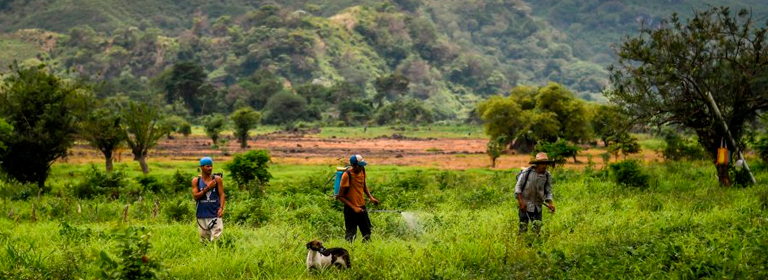For the first time, a team of researchers gathered epidemiological investigations carried out in 43 countries in Latin America and the Caribbean between 2017 and 2022. UCM Research Director Liliana Zuñiga presented the results of the compilation.
 Multiple physiological and neurobehavioral disorders in agricultural communities in Latin America and the Caribbean point to the same culprit: pesticides.
Multiple physiological and neurobehavioral disorders in agricultural communities in Latin America and the Caribbean point to the same culprit: pesticides.
This was evidenced by a compilation of studies carried out in 43 countries of the continent on the health effects of exposure to pesticides.
«The result was very categorical: we are in a region of the planet where we have the same pains regarding agricultural activity and our rural populations, who are vulnerable, sometimes with little access to information about what working with pesticides implies. Many do not even know what a pesticide is and call it ‘remedies’ or ‘liquids’. This happens not only in Latin American countries, but also in some parts of the United States, in communities where there are many migrants,» said Liliana Zuñiga, Director of Research at the Universidad Católica del Maule (UCM).
The doctor in Genetics, who headed the compilation work together with the doctor in Public Health of the campus, María Teresa Muñoz; and the academics of the University of California, Dr. Carly Hyland and Dr. Ana María Mora, emphasized that the compilation corresponds to an unprecedented effort to discuss the implications of pesticides in the whole region.
«It was a collaborative work of more than twenty authors, most of them from Latin America. A small committee was established that was intensely dedicated to writing and that I had to lead from UCM, because we were the largest and best positioned group. It was a very arduous literature review, where we weighed the evidence and were able to draw our own conclusions,» she added.
The compilation, the results of which were presented in a webinar organized by the Latin American Chapter of the International Society for Environmental Epidemiology (ISEE-LAC), covered research between 2017 and 2022.
«There is an association between pesticide exposure and impaired neurobehavioral performance, psychological distress and suicidal ideation among adults and a consistent relationship with cancer, including leukemia in children,» an expert pointed out during the meeting. «These results must be interpreted with caution given the diversity of methodologies used”, she pointed out.
The Birth of a Network
Zúñiga, a member of the UCM’s Center for Research and Advanced Studies of Maule (CIEAM), explained that the study —published by the journal «Environmental Health Perspectives» in September 2022— noted the need to create a continent-wide alliance.
«This is an ad honorem collaboration that emerged at the IV Congress on Public Health in Chile, held in conjunction with the VI Congress of Epidemiology in 2016 in Coquimbo, which brought together many Latin American researchers and investigators. Those of us who had related topics in pesticides and health, held a post-congress meeting where research results were shared and there the idea was born, which is actually more global, to form a Latin American network of research on pesticides,» she said.
Along the same lines, the authority pointed out that the ultimate purpose is to improve regulations. «The intention is always to have an impact beyond our colleagues and collaborators and to transfer these results and evidence to public policies, as happened in Chile with the recent prohibition of some active ingredients in pesticides based on the evidence generated, where UCM played a relevant role,» she said.













